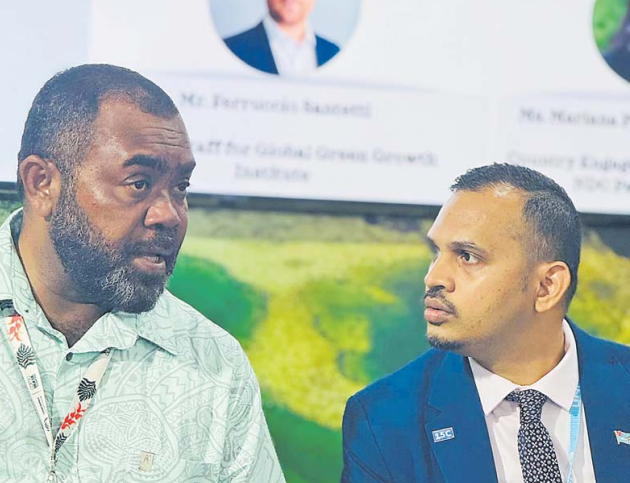FIJI has secured a major gain at COP30 by expanding its Loss and Damage Fund proposal ceiling from $US5million ($F11.4m) to $US20m ($F45.7m), a shift the Government says will improve the country’s access to climate finance.
Permanent secretary for Environment and Climate Change Ministry Dr Sivendra Michael said the development would support Fiji’s efforts to secure funding for climate-related impacts and guide adjustments to national financing strategies.
Dr Michael said Fiji’s updated Nationally Determined Contribution placed a strong focus on adaptation.
“Fiji’s updated Nationally Determined Contribution (NDC) places strong emphasis on adaptation, which remains dependent on grantbased financing,” he said.
“And so for us, we are very clear that our adaptation targets are conditional on grant-based financing. We need grants to put in place adaptation measures across each of these sectors.”
He said gender equality, inter-generational equity, traditional knowledge and monitoring of adaptation co-benefits were important cross-cutting principles in the NDC.
Fiji is among a small group of countries integrating loss and damage targets into this round of NDC submissions, reflecting impacts that can no longer be avoided.
“When we are not able to adapt and mitigate the ongoing losses, what does it mean for us as a nation to adapt to the losses and damages? “There is a need for institutional structures to be able to respond effectively.”
Dr Michael said Fiji’s leadership roles at COP30 and on the Loss and Damage Board helped shape financing priorities.
“It’s very important that we have that in our NDCs so that we can actually align to what we want financed through these opportunities that have been presented to us.”
Call for Pacific nations to forge own paths
PACIFIC leaders have been told to seek alternative pathways for climate support if their priorities are not reflected in the official UN negotiations.
Brazilian President Luiz Inácio Lula da Silva urged the region to consider partnerships, bilateral agreements, or other international programs to secure funding and action.
The advice followed a meeting with Pacific delegations, who have been pressing for stronger recognition and financial assistance for countries facing accelerating climate impacts.
Minister for Environment and Climate Change Mosese Bulitavu said discussions with UN officials, including the Secretary- General of the UNFCCC, reinforced the urgency of Pacific concerns.
“It was a good meeting.
They admitted that the Pacific is the most important region in the world right now when it comes to climate change and the UNFCCC process,” Mr Bulitavu said.
“The Pacific leaders raised concerns from their national statements, side events, and interventions to ensure the region’s interests are included in COP negotiations.”
He said influential figures must continue championing Pacific issues even if some proposals are not fully reflected in the current negotiating text.
Mr Bulitavu said leaders also raised the need to close financial gaps and secure direct support for communities most affected by climate impacts.
“He (the UN Secretary- General) has taken that on board and will come back to us.”
Pacific leaders later met with the head of OCEANIA, led by Palau’s President Steven Victor, and engaged with the COP Presidency.
Mr Bulitavu said they were assured that unmet priorities could still be advanced through separate mechanisms, including initiatives supporting the shift from fossil fuels to cleaner energy.
Moving communities from rising seas a challenge
PEOPLE living in climate-vulnerable settlements in Fiji are often reluctant to relocate even as rising seas and worsening weather threaten their homes, says Minister for Housing and Local Government Maciu Nalumisa.
He told a COP30 panel on Climate Mobility for Resilient Futures in the Pacific that hesitation is shaped by strong cultural, family and traditional ties to land, making the decision to move emotionally and socially complex.
Mr Nalumisa said Fiji’s climate mobility framework was deliberately people-centred and anchored in national policies.
“The climate mobility is treated as a national priority and is embedded across key development policies, including the Climate Change Act 2021, the Climate Relocation of Communities Trust Fund 2019, and several financial and risk-management guidelines,” he said.
“These instruments help ensure that decisions around relocation are aligned with community needs and grounded in comprehensive vulnerability assessments.”
He said relocation was always viewed as a last resort.
“There are no other adaptation options that are available; then relocating is our last option.”
The social and cultural challenges of moving entire communities make the process lengthy and sensitive, particularly for small island nations.
Mr Nalumisa noted one ongoing village relocation that required approval across two successive governments before the community agreed to move.
“Persistent consultations and clear communication were critical to help residents understand the long-term risks of remaining in place.
“But financing also remains a major factor, with government resources required to support families through the transition.”
He said Fiji used a collaborative model, with a dedicated task force working with communities from the start to ensure participation, transparency and trust as climate pressures continue to escalate.



